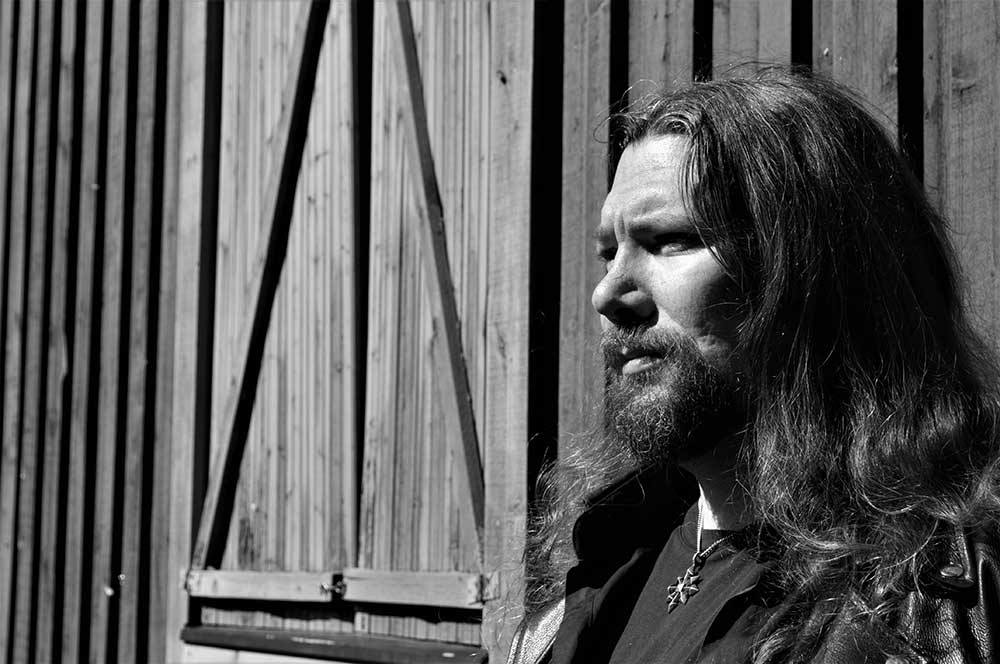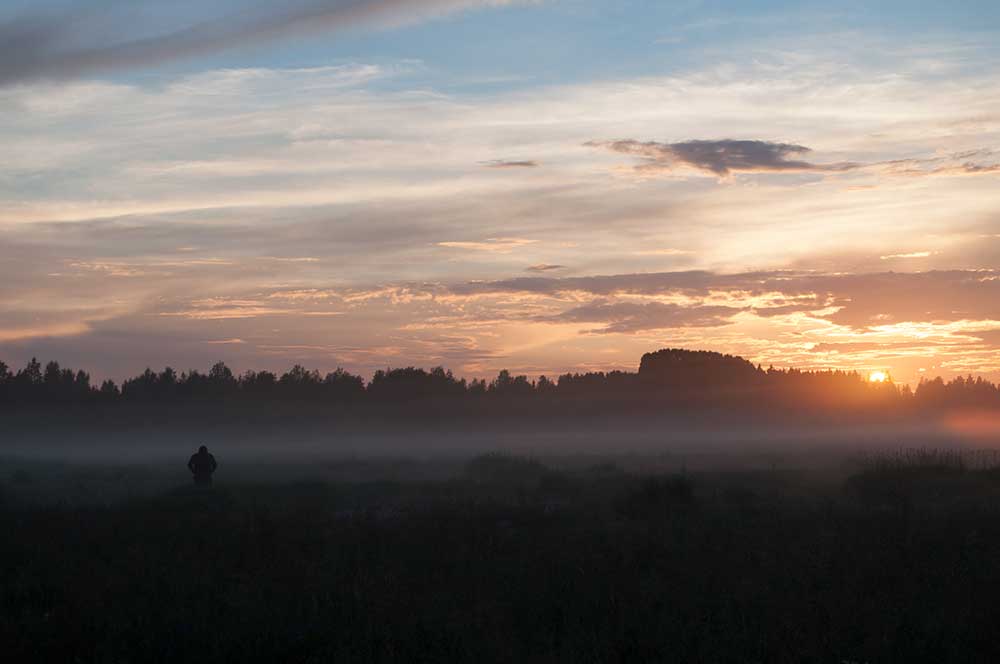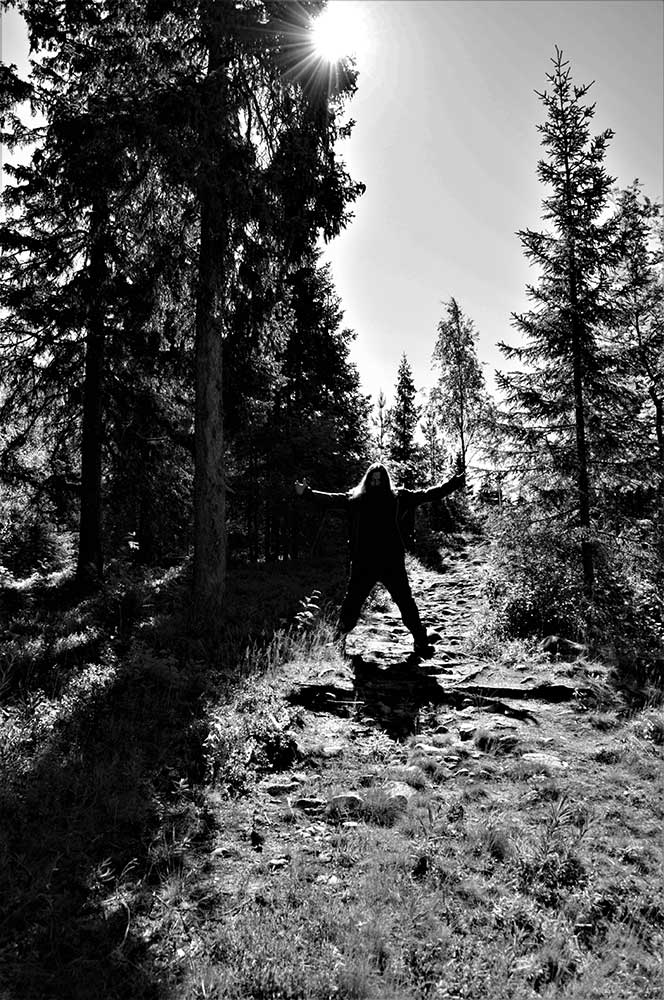Häxkapell
2022-01-05
by Niklas Göransson
The flames of emptiness – Häxkapell is a Swedish black metal band which explores the liminal mysteries of existence, as seen through the eyes of its creator, Oraklet.
– “Eldhymner” is a massive slab of metal contemplating the element of fire. Violence and vitriol, melodic melancholy, and epic moments of grandeur… all rooted in the sounds closest to my heart – black and death metal – and with strong ties to Nordic folk and old heavy metal. Just like the music, fire has many faces. It can be a source of power, a deceitful mistress, a bringer of life and warmth, or a cauldron of wrath and anger. Fire can grant you many gifts, all of which come at a price. A fickle and dangerous friend or foe, slave or master. The music and lyrics go hand in hand; as such, the album turned out greatly varied in the portrayal of its theme.
HÄXKAPELL’s debut was released by Nordvis in October 2021. The project’s mastermind, Oraklet, recorded everything but percussion himself, using his own equipment. The drums were recorded at Nordvis ljudstudio, courtesy of DE ARMA and STILLA drummer J.M. Among the many musical layers, we also find the occasional violin contribution from Oraklet’s wife.
– There’s something about the sound of an instrument from the family of strings – violin, viola, cello, and double bass – that makes you harken closely, and I believe this has to do with its proximity to the human voice. On a violin it is possible, even natural, to mimic certain parameters also found in singing like vibrato, long sustained notes, glissandi, dynamics, and so on. Then again, the same could be said for many other instruments. But there’s just something about its timbre, that connection between bow and string, which produces a tone akin to a wooden version of a female voice. I’ve been in love with the violin for as long as I can remember, and I’m fortunate to have a spouse with the skills I lack. Upcoming albums will likely include other string instruments such as the soprano rebec, a medieval pre-cursor to the modern violin, and the violin’s big sister: the viola.
The violin appears in the slower and heavier parts – would it be possible to get it to sound good in a blastbeat section?
– For sure – it’s all in the execution. There is, in fact, a violin melody during the blasts on the ending part of “Eldskapt”; however, it’s doubled by keyboards and therefore not as prominent as a minute later, when the drums slow down and the synth fades out. Since the sonic properties of the frequencies between distorted guitar and violin are roughly in the same ballpark, many tremolo guitar-melodies could easily be transcribed for violin. If I were to compose a violin part on top of furious blast beats, I’d probably approach it with the same mindset as I would writing guitar leads. Executed correctly, I imagine it would end up having more earthen drama than its guitar counterpart. Perhaps I should start writing all my melodies for the violin?

How different of a record would “Eldhymner” have been if it had taken form through extended rehearsals, as opposed to composed by yourself?
– The vision would’ve become diluted. Whenever a circle of one is expanded, contrasts, friction, and compromises arise; this is sometimes beneficial, while other times not. HÄXKAPELL – being a vessel for my introspective journey into the abyss of mind and soul – is a highly personal source of expression which needs to be guided in a singular direction without conflicting opinions getting in the way and threatening to veer it off course. I do enjoy composing together with others, if the basis of a band’s sound and output is meant to be a blend of the different individuals in it. That in itself can create wonderful new things with the fusion of diverging tastes, trying out stuff in the rehearsal place, jamming, and so forth. But this wouldn’t work in HÄXKAPELL, since the sole point of its creation was to delve into the liminal mysteries of existence through my own mind and beyond: to harvest energies, ideas, and impulses from these depths and channel them through my filter of expression. Egotistic? Perhaps, but I’m just being humble before the process by giving HÄXKAPELL the weight and purpose it deserves.
Oraklet is not only a multi-instrumentalist, an academic, and a music teacher – he also has plenty of experience from singing in professional choirs. D.G. from MISÞYRMING, who has a similar background, told me it was hugely beneficial for him as a musician to study notes, analyse complex song structures, and learning to sing something completely different than the person next to him.
– Yes, I can relate to that. I stumbled into the world of classical choirs after high school, when I began my formal music education, and two decades later I’m still actively recording and touring. My brain has the affliction of constantly needing to analyse everything it encounters, so – since the works we perform are often far more complex in terms of harmony, rhythm, metre, and texture than most other music – the choir repertoire teaches me lots of new ways to compose and arrange. Also, singing contemporary pieces from sheet music, note for note with the utmost care taken to perform every detail exactly as it was written, is a mental, physical, and artistic challenge. Pitch and intonation, rhythm and timing, musical phrasing, text articulation, dynamics, voice timbre… even turning the pages silently when recording is a parameter that requires a few extra brain cells. And then you’re supposed to channel energy and emotion in a musical way within this tight framework, which by some miracle is possible.
For almost two decades now, Oraklet has been singing for Erik Westberg – one of the most accomplished choir conductors in the world.
– I’ve learned a lot from him regarding subtle nuances, shifts, phrasings, and sounds; all of which have helped me grow and evolve as a musician. I put these learnings to good use in almost everything I do, with HÄXKAPELL being a fine example. On “Eldhymner” this is highly evident in the choir parts, most notably the balance, timbre, textures, and voice leading: meaning, how the individual melodies for each voice move within the harmonies and chords. This extreme attention to detail – which has been sharpened and automated through years of choir practice – has made me a better pianist, guitarist, bassist, and singer of a harsher output than classical would permit. Most music-related matters are applicable to the majority of instruments.
Oraklet places heavy emphasis on moods and atmosphere, while also being rather meticulous and analytical. In the words of a layman: trying to get everything tight as hell while retaining plenty of feeling. I’m assuming this is what most musicians strive for, but it’s clearly easier said than done. ‘Feeling over tightness’ is a common saying, indicating that the two might be difficult to combine.
– In music, atmosphere is everything. If forced to choose between feeling and technical perfection, always go with the former. Always. But the goal is not having to choose. I believe it’s more about mindset than theory; I differentiate practising from performing music, or musicking. You practise your craft to pick up useful tools you can then sharpen and learn how to use. Theory, ear training, composition, arrangements, technique, scales, chord voicings, alternate picking… whatever. And when you start playing, just forget all about that shit and be in the moment. Listen. Listen to your heart, your soul, and your feelings. Channel. Channel your heart, your soul, and your feelings. Channel the other impulses that come from beyond you. Listen; be a vessel and let them flow through you.
The point being to acquire the skills necessary to put all this into practice without conscious thought.
– You hear a series of notes in your head and instantly know which ones they are, because you’ve practiced ear training and theory. You can find them on the guitar fretboard without looking, because you’ve studied where the different notes, scales, and chords are situated. You can play the notes in a manner of your choosing because you’ve practised the required techniques. This is freedom. With study, you free yourself from having to analyse in the moment, and you just musick. Of course, this applies to composing, arranging, and producing as well. The better you know your tools, the freer you are to use them as you see fit. Returning to your question: to attain that sacred paramount of creation, the place where atmosphere and feeling reign supreme, you must have something urgent to convey. Then, execute it with honesty, passion, and integrity. Theory and analysis can never decide if something is good or bad, but it can explain many things about what you like or dislike. So, why not use it?

HÄXKAPELL was founded in 2015 and recorded a demo, “Om sanningen”, the following year. Upon its release, Oraklet employed a somewhat unorthodox promotional approach.
– My strategy was to not have a strategy, and not do shit. The demo was made because I needed to make it; I then printed it on CD, mainly to have it materialised for myself. Since I’d already done the artwork and such, I figured I’d make fifty extra copies in case someone was interested in owning a physical copy. Then, out of curiosity, I decided to make it available online, just to see what would happen if I didn’t promote it at all. Would my demo disappear and fade into oblivion among the torrent of other releases? Or still find its listeners by virtue of… yes, what? Luck? Quality? Contacts? No clue as to which of these attributes led the thirsty to the well but the oblivion-part won the war, I’d say.
Had you heard from any other labels when you came into contact with Nordvis?
– There were a couple of offers from respectable labels, so I could’ve inked a deal but there was no great urgency. The embers of creation were momentarily satiated, and the next work was still somewhere beyond the horizon. Once those winds began blowing harder, I had discovered Nordvis and considered it a good fit for HÄXKAPELL. So, I abandoned my strategy, emailed Andreas, and here we are now.
You both operate out of the far north of Sweden – was geographical proximity a factor?
– One of many. Also, Nordvis’ creed and manifesto, its close bond with the wilderness, and a Nordic streak; all of these seemed both beneficial and fitting for HÄXKAPELL. “Eldhymner” was still in its embryonic stages, so my other band SONS OF CROM was the first to jump aboard the Nordvis ship. Andreas and I have become good friends over the years, and there are many aspects I’ve learned about the way he runs his label which I respect and admire. Genuine and honest, no bullshit, solid integrity, and a ‘what feels right is right’ attitude. I’m pleased to be a part of the Nordvis family, sharing the roster with great bands such as SKOGEN, STILLA, and ARMAGEDDA.
Oraklet has cited plenty of influences from the Swedish black metal scene – not only the most obvious ones such as DISSECTION and BATHORY, but also more obscure gems like SORHIN and THRONE OF AHAZ. In the latter case, I trust he is referring to the debut and demo exclusively, as the second album was one of the worst musical disappointments in recorded history.
– Haha, yes! THRONE OF AHAZ peaked early. The debut album’s worship of “Under the Sign of the Black Mark”-era BATHORY is fucking fantastic. I’m sure they’d be much more well-known today, had they gotten that one out without the years of delays it got caught up in.
THRONE OF AHAZ’s “Nifelheim” was recorded in March 1993 but not released for an additional two years. They were from Umeå, which is also in the northernmost region of Sweden, and from the same generation of Swedish black metal as Oraklet.
– Ah, the fantastic yet terrible teenage years: seeking your identity, seeing everything in black and white, trying out stuff fully head-on, being fundamentalistic about your beliefs… such a chaotic and powerful time! As a music junkie of epic proportions, I’ve always delved wider and deeper in my forays into different genres. More extreme, more melodic, more dynamic, more violent, more complex, more insane… I just had to have it all, and I believe that’s why I fell for the more extreme branches of the tree of music such as black metal, and why I’ve always both played and listened to practically everything from classical, jazz, and EDM to punk, prog rock, and power pop. Black metal is special in many regards, mostly because of the spiritual and ideological approach combined with violent and uncompromising sonics.
How did the 90s black metal experience shape you as a person?
– Discovering black metal in my teens has greatly affected my views on life, death, and art. The exploration of darkness, chaos, and the malevolent energies within and without had fascinated me from an early age but really got going during this phase. By now, my journey has had many turns yet continues deeper towards the same source. The Crowleyan creed of ‘do what thou wilt’ permeating the scene discourse has stuck with me, even though I sometimes cringe at the self-imposed boundaries many set upon themselves – limitations in direct opposition to the aforementioned slogan. As a musician, I think the most profound lesson I learned from black metal was that there can be something more to the craft than the notes you hear and play; something more important than the music itself, but which needs it to be conveyed. A channelling of energies from beyond, tapping into currents unseen… that’s what really matters.

HÄXKAPELL’s lyrics are created through a process of meditation-induced psychography, or automatic writing; hence the nom de plume Oraklet, which is Swedish for ‘the oracle’. I’ve had many discussions with musicians about composition through flow states, but never spoken to anyone who produces text in such a fashion.
– This was something I stumbled upon during my childhood; I didn’t even know others did or could do it until much later. I don’t remember the first occasion, but I must have discovered it totally at random. At times I get totally caught up in my thoughts and just drift away on inner voyages – sort of like the opposite of an out-of-body experience – and one of those times I must have been holding a pencil. When I found myself reading text in my own handwriting which I hadn’t authored… man, that was a creepy feeling. Naturally, this had to be explored further! Nowadays, after years of practice, I can switch it on at will, and it works both regarding lyrics and music.
To what extent is unconscious composition discussed in musical academia?
– If we’re talking about classical music, unconscious writing is an odd bird without easily quantifiable or provable traits or data. Well, not unless you have neuroimaging technology at your disposal. This kind of creative activity is often treated with mild suspicion and thinly veiled contempt among low to mid-level academics – but the higher you get, the less concerned people are of already proven facts and more excited about possibilities and roads less travelled. Of course, this is a gross simplification, but such are the leanings I’ve observed in scholarly circles. Cling onto what you know, until you know enough; then you can let go and open your eyes and ears.
This applies primarily to the classical field – switch to music based on improvisation, like jazz or blues, and the concept of flow states is much more prevalent.
– Being in the moment, channelling your emotions, ‘just playin’’ and the like are common slogans in these genres; consequently, the means of getting there are more widely explored. I wouldn’t know if a scientific consensus regarding this phenomenon can be found, as I haven’t read any research papers about it. But this is nothing new, so I’m sure there’s a lot out there by now. If some revelatory empiric evidence is to be found somewhere, I’d love to read about it. But I’m not holding my breath as this seems unlikely to me, considering the abstract nature of subconscious creation. For the time being, I’m content with exploring it hands-on instead of theoretically – unearthing its secrets one by one with trial-and-error practice.
What’s next for HÄXKAPELL?
– I’m very much looking forward to the vinyl release of “Eldhymner”, which will finally take place on January 14. Furthermore, HÄXKAPELL will be taking to the live stage in the not-so-distant future, but the primary focus is – and always will be – on the process of creation. It’s the paramount reason for HÄXKAPELL’s existence. The next album is just about done in terms of songwriting, so I’m hoping to get it recorded during the winter. The creative fires burn as brightly as ever, and I can already see the third chapter in their flames.



